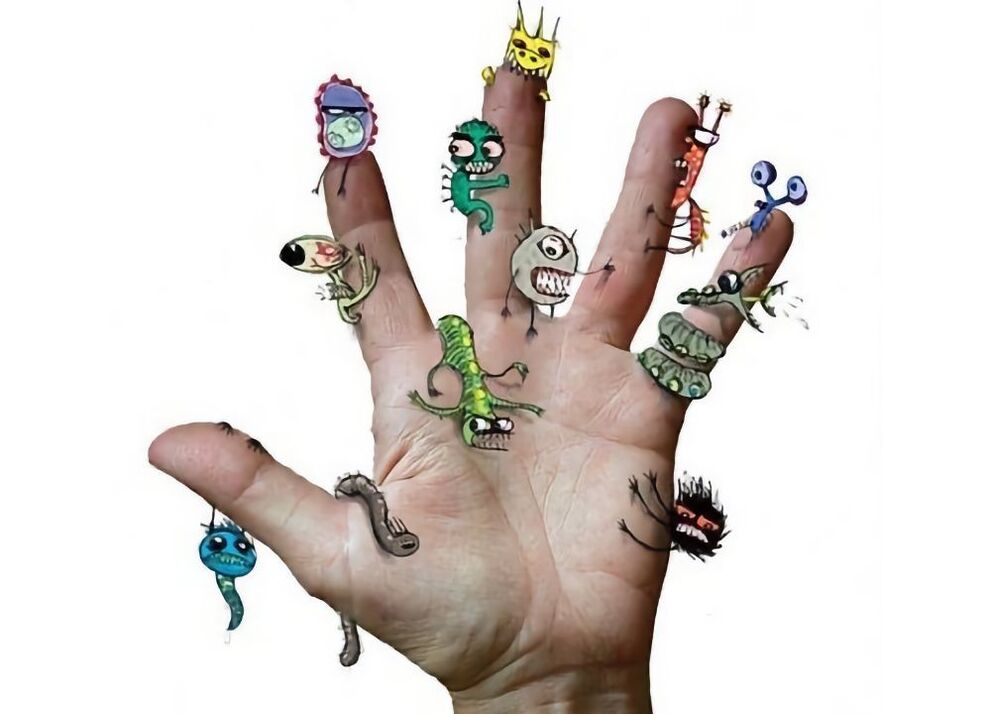
According to the World Health Organization, every two people on the planet are infected with worms. Many people believe that parasites do not pose much of a health hazard. Not everything is that simple, however: The worms affect vital internal organs: the heart, lungs and brain.
Worms - who are they?
Worms are parasitic worms that can select human, animal or plant organisms as hosts. There are three types of worms in total:
- tapeworm. This class includes about 3500 species of worms. The length of the parasite varies from a few millimeters to 10-15 meters;
- lucky.Parasites are so named because they have suckers to get food. Humans can be infected with about 4 dozen flukes. Usually, the worm is no more than 5 cm in length;
- roundworms.There are more than 24, 000 such worms. Roundworms are spindle-shaped. Usually they do not exceed 0. 5 meters in length.
You can get worms in a number of ways. However, the most common parasite invasions occur due to:
- Poor hand hygiene.
- Unwashed vegetables, fruits; undercooked or undercooked meat, fish - the use of such products increases the risk of parasite invasion many times.
- Keep food outside the refrigerator open. Insects are able to transfer worm eggs into unpackaged storage products.
- Contact with pets.
The main symptoms of the presence of parasites in the body:
- nausea, vomiting, diarrhea;
- lose weight;
- allergic rash;
- bloating;
- anal itching;
- dream of grinding teeth.
Learn more about signs of internal parasitesRead our articles.
Which worms are most commonly found in our country? Consider the most common types of parasites and the diseases they cause.
tapeworm
The body of a tapeworm is made up of segments, ranging from 3 to 5000 total segments. The main element to immobilize the worm is the head, in addition to the suction cups, hooks.
The most common causes of tapeworms are:
clover disease
The causative agent of the disease is a broad tapeworm that affects the human gut.The development of worm eggs takes place in fresh water. The protocol for tapeworms to enter the human body is as follows:
- The eggs are swallowed by crustaceans living in the reservoir.
- Infected crustaceans are eaten by fish.
- A person becomes infected with the parasite by eating fish that has not been adequately heat-treated.
Symptoms of the disease appear 1. 5 months after infection. The main sign of pathology is the presence of white fragments of worms in the stool.
Tapeworms attach to the intestinal mucosa and absorb large amounts of vitamin B12. For this reason, people with dilobites often develop anemia. In addition, tapeworms can cause increased liver, spleen, and intestinal obstruction.
Tenariños
The causative agent of the disease is the bovine tapeworm, which mainly lives in the human small intestine. During its development cycle, the worm replaced two owners: cows in the middle, and people mostly. The bovine tapeworm can live in the body for up to 20 years, multiplying and harming health. The disease is common in many regions, but it is most common in colder regions.
Often, people get shingles after eating undercooked or undercooked beef.
The disease usually progresses without obvious symptoms and is discovered incidentally when a person sees worm components in his stool. In some people, pain on the right side of the anterior abdominal wall may occur in addition to the main signs of a worm infection.
Adult worms are able to penetrate the appendix, pancreatic duct, and bile duct, where they initiate an acute inflammatory process. Intestinal obstruction may occur with the infestation of various parasites.
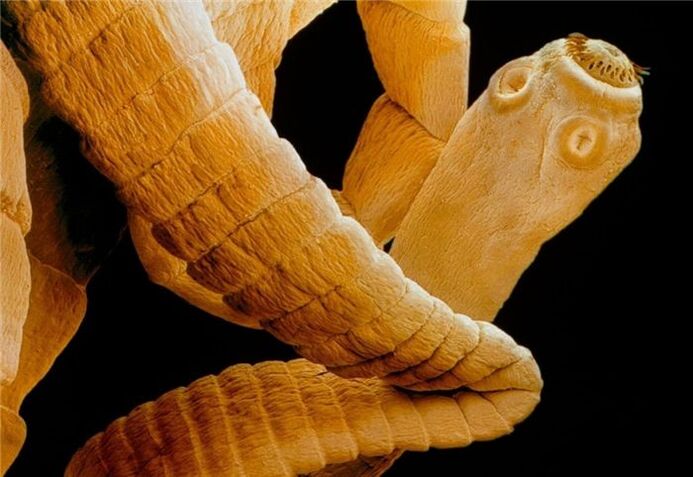
Ganglion cyst
The causative agent of the disease is the pork tapeworm, which initially affects the human small intestine.Human infection occurs through consumption of raw or undercooked pork.
Parasites can invade various organs and tissues, causing pain in the abdomen, back, and extremities. The most favorable pathology occurs when the worms are located in subcutaneous fat and skeletal muscle tissue. When invading the eye muscles, the worms can cause vision loss, lacrimation, and photophobia. The brain-beating pork tapeworm can be deadly.
lucky
Trematodes have a leaf-like shape and are characterized by a high reproductive capacity at different stages of their life cycle. Worms reproduce not only sexually through fertilization, but also without fertilization. In addition to the suckers, the worms have many hooks and spikes so they are firmly attached to the mucous membranes of the organs.
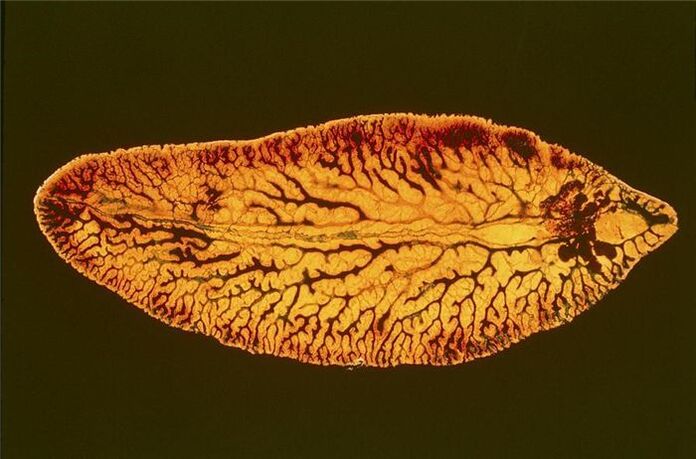
Common symptoms caused by flukes:
- Fascioliasis;
- opisthorchiasis;
- Paragonimiasis.
Fascioliasis
Fascioliasis occurs when the liver or gallbladder is damaged by liver flukes.Basically, the infection occurs when eating vegetables that are irrigated with water from an open reservoir.
In addition to the standard signs of a parasitic infection, a person may experience an asthma attack with shortness of breath, facial redness, mydriasis and tachycardia. Obstructive jaundice occurs when an adult causes a blockage of the bile ducts. Pathological signs:
- right rib cramping pain;
- yellowing of the skin;
- fever;
- Colorless feces.
post-orchidism
The causative agent of this disease is Feline fluke. The parasite gets its name because, in addition to humans, it frequently infects cats and other fish-eating mammals.
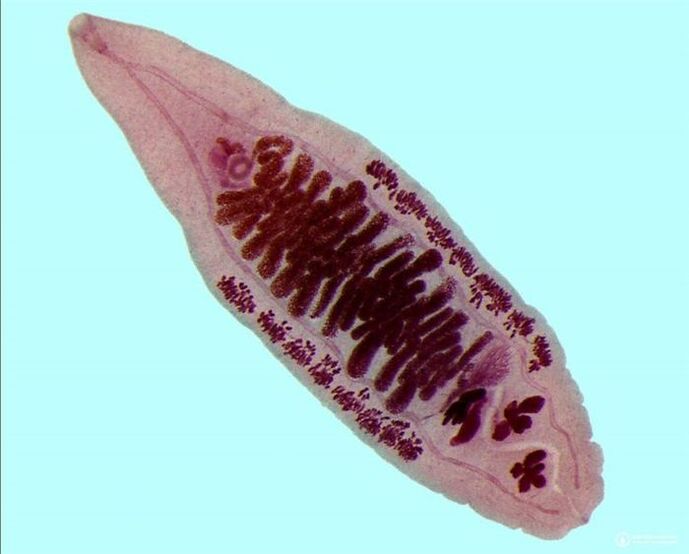
Typically, cat flukes affect the liver and pancreas, causing the organs to become inflamed. Symptoms vary and depend on the number of parasites. Patients may experience:
- symptoms of poisoning;
- fever,
- measles;
- itchy skin;
- Muscle, joint, right rib pain.
In some cases, the worms can cause enlarged lymph nodes, which can develop into jaundice. Chronic forms of the pathology often lead to hepatitis, cirrhosis.
Paragonimiasis
The culprit of the disease is a paragonimiasis that enters the human body along with infected crustaceans.
First, the parasite enters the human gut and then the abdominal cavity. The end of his journey is lung tissue. Additionally, the worms are able to penetrate the brain and affect the central nervous system.
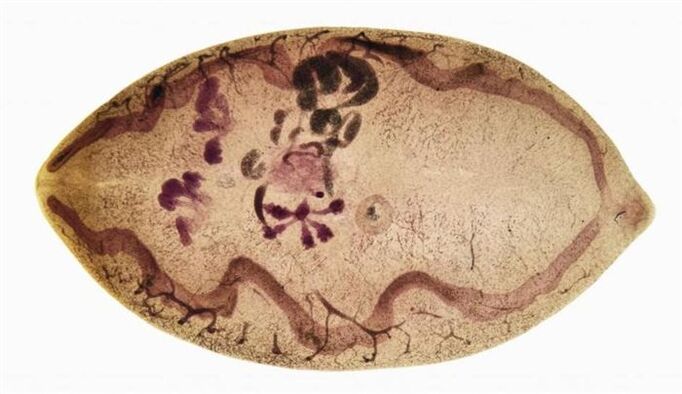
Specific signs of a parasite invading the lungs:
- chest pain syndrome;
- expectoration, which may contain pus and blood;
- fever.
In some cases, the worms disrupt the ventilation function of the lungs and gas exchange during breathing.
roundworms
Due to their structure, roundworms (nematodes) can survive even under extreme conditions.Their bodies are covered with three layers of skin-muscle sacs that reliably protect the parasites from external influences.
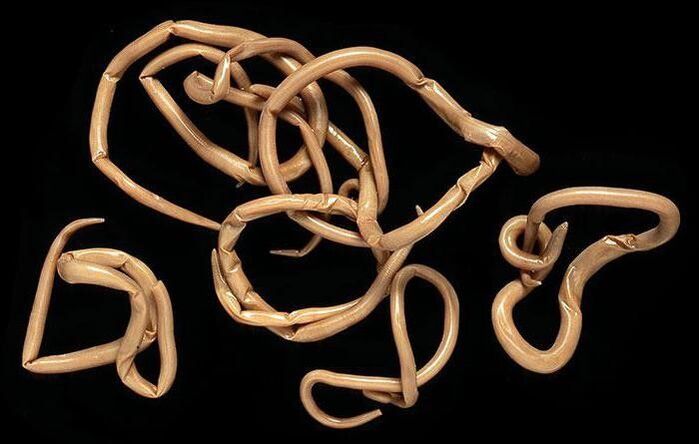
Common diseases caused by nematodes:
- Ascariasis;
- Enterobiasis;
- Trichinosis.
Ascariasis
The development of the disease triggers roundworms, which initially settle in the small intestine. The average length of an adult is 40 cm.Parasite larvae can enter the human digestive system along with unwashed vegetables and fruits, and contaminated water.In addition, ascariasis is often caused by poor hand washing before meals.
During the larval invasion, a person may experience hypothermia, allergic rash, and cough with clear phlegm. Signs of the intestinal stage of ascariasis (diarrhea, abdominal pain) are only observed in the presence of several parasites. Usually, living in a worm's gut is asymptomatic.
Complications of multiple parasite invasions:
- bile duct obstruction;
- purulent inflammatory processes in the gallbladder, liver;
- Inflammation of the appendix;
- intestinal obstruction.
Enterobiasis
The provocateurs of this disease are pinworms - small worms up to 1 cm in length.Worms invade the human digestive system in the same way as roundworms.
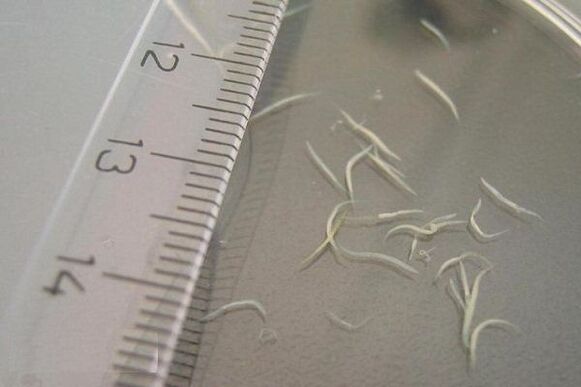
Currently, enterobiasis is the most common parasitic disease in the world. Basically, the disease is diagnosed in children under the age of 10.
As in previous cases, symptoms only appeared when a large number of parasites invaded. Children often experience diarrhea, mucus in the stool, difficulty and pain in digestion, anal itching, and nausea. In severe cases, leg cramps may occur. In addition, pinworms are able to penetrate the genitals, causing their acute inflammation.
Trichinosis
This disease causes Trichinella - one of the smallest parasites. Parasites rarely exceed 4 mm in length. During the larval stage, worms can infect skeletal muscle. The exception is the myocardium—the muscle tissue of the heart. Adult worms live in the small intestine.
As a rule, human infection occurs when half-raw pork is eaten.At the same time, for the development of the disease, it is enough to consume only 30 grams of meat affected by parasites.
Pathology manifests as standard symptoms of parasite invasion. In advanced stages, swelling of the eyelids, face, arms, and legs, lower back pain, and masticatory muscles may occur. Possible complications are complete or partial incapacity, airway paralysis.
How to avoid getting parasites?
To reduce the risk of contracting parasites, it is important to follow these rules:
18 signs of a parasite in your body
This parasite exists in the human body and has a serious pathogenic effect. At the same time, the same parasite can have multiple mechanisms of action on humans at the same time.
WHO believes that there are currently about 4. 5 billion people in the world who are constantly affected by various parasitic diseases.
This question is also popular because it is difficult to diagnose parasitic diseases. Humans have helminth infections (massive parasitic diseases) even after the parasites have left. If the patient notices this, then of course he will come to the medical facility in this case. Parasitic diseases can also be detected during preventive screening. But unfortunately, these cases are just a drop in the bucket.
Mechanism:
mechanical shock.For example, if a roundworm is in the intestine, it will of course press on and injure the intestinal wall. In some cases, an inflammatory process is induced. For example, if the echinococcosis is located in the liver, lungs or kidneys, tissue compression will occur accordingly. This is a classic mechanical effect: bursting, stress, dysfunction of the organ or system in which the parasite is present. Not only are there a large number of luminal parasites in the gastrointestinal tract, but there are also many tissue parasites that can fully realize the so-called mechano-action.
Irritating allergic reactions.Unfortunately, when a person has an allergic reaction, he starts to go around in circles: go to a dermatologist, a pediatrician, a general practitioner, an allergist, but doctors don't always rule out the possibility of parasites entering the body. first place.
Any parasite, even a mediocre pinworm, can lead to the formation of a severe allergic reaction, and they can change on the skin and affect the bronchopulmonary tree. For example, obstructive bronchitis, which is common in children, may be due to a certain parasite living in the gut.
Effects on the microflora.It's no secret that humans are the planet of a vast microbiome world. The microbial community that inhabits all our mucous membranes, skin, organs, tissues is a friendly community of microbes that produce us vitamins, minerals, hormones, enzymes, and help our bodies function properly. Now, unfortunately, in the presence of the parasite, it begins to actively die.
Immunosuppressive effects.Today it is clearly demonstrated that the waste products of parasites greatly suppress the immune system. They just stop it. In addition, parasites over millions of years have learned to mimic and evade the immune system, producing special anti-enzymes. Thereby blocking the immune system, and sometimes a person can suffer from various parasitic diseases for decades. Sooner or later this can lead to serious disease in the entire body or in individual organs or systems.
Anti-enzyme effect. Unfortunately, parasites don't just consume our bodies. If we try to eat vitamin foods, mineralization, vitamins and mineral complexes, they are not always good for us, because our gluttons will take up most of them.
Mechanism of neural reflex action.The parasite's waste can poison the nervous system. This often affects the psycho-emotional state of adults and children. Any psychosomatic disease can be associated with a parasite invasion. The child may have hyperreactivity and vice versa, lethargy, tearing, a tendency to depression - all of which may be the result of the presence of parasites in the body. For example, even the simplest giardia can produce toxins. Get them in microdoses, but they're still the same toxins as psychoactive drugs. Of course, a child or adult with this persistent poisoning can put severe stress on the functioning of the central nervous system. From here, various psychological and psychiatric disorders arise: sleep disorders, neurological disorders, various psychological problems. And, not the parents, nor the patient himself, if he were an adult, the idea of a parasite invasion would not even arise.
The most serious and scary thing in my opinion is the stimulation of tumors by parasites. The long-term presence of endoparasitic diseases can cause problems such as tumor formation: benign and malignant. Furthermore, tumor stimulation may be related to two factors.
The first factor is the direct damaging effect of specific organ tissues.
The second factor is an effect mediated by strong suppression of the immune system. The problem is that the part of the immune system responsible for antiparasitic protection is also responsible for antitumor protection. Cancer cells may develop in the body due to improper division. In this case, the deficiency of the immune system is manifested, and this cell is not recognized by our immune cells in time, nor is it killed in time.
When can the presence of parasites be suspected?
I will now give you a list of clinical manifestations of parasitic infestation, in which case you should contact your doctor quickly to clarify whether you really have this diagnosis.
- The most common clinical symptom is anal itching. This is heard by many people, so it is related to the presence of parasites, especially in children's practice.
- To grind teeth in a dream. Again, this can often be done in pediatric practice. Moms suddenly noticed that their children started grinding their teeth in their sleep. Why is this happening? Many times a child's squeaks are associated with scary dreams. This is exactly the mechanism by which we speak of a toxic effect on the central nervous system. The child had a terrible dream, and he gritted his teeth in fear in his sleep. This is one of the reasons. There are other reasons. The formation of trismus, or increased tension in the muscles of mastication, can also be a symptom of this condition.
- Drooling at bedtime, drooling in the morning, nausea when brushing teeth in the morning. These are all manifestations that can indirectly indicate the presence of parasite invasion in the body.
- Peeling of fingers and toes, peeling skin in layers.
- Increased hunger and sometimes fainting.
- Allergic rash on the skin. In lecturing to doctors, I often draw attention to the fact that doctors are in no rush to administer allergy medication to one patient or another. Learn from start to finish - if any worms have invaded. The sudden appearance of a person in a short period of time because of a high allergy may first indicate a parasite infestation in the patient.
- Eyelid rash, peeling, swelling. , a mental disorder with no known cause.
- any itching of the skin. Especially in practice for kids. First of all, it is necessary to rule out the presence of parasitic invasion.
- Troubled by symptoms such as bloating, bloating, and unsteady stools. Any problems with the gastrointestinal tract.
- Underweight and vice versa, overweight. For parasitic diseases, it can be both.
- There are many chronic diseases at the same time. Joint disease, bronchopulmonary disease, gastrointestinal disease. If suddenly a person starts getting sick in stages, then one, then a second, then a third, then a fifth, then a tenth, and initially for no apparent reason, then it's a consideration that existschance of parasites in the body.
- In poor health, the diagnosis is unclear. Such patients can also see various specialists to try to check one of them. Ultimately, the diagnosis will remain unclear and the health will remain poor.
- Unexplainable pain in the abdomen, unstable, sudden cramping, cramping. It is also necessary to rule out the presence of parasites, especially in pediatric practice.
- Long-term toxic allergic manifestations. Periodically sudden, incomprehensible allergic reactions to foods.
- Persistent anemia. When the haemoglobin is markedly reduced and difficult to correct. It is worth thinking about, first of all, whether there is a parasite invasion in the human body.
- In children: physical, psychosomatic, psycho-emotional development, hyperreactivity and vice versa, lethargy, in school children, poor absorption of materials - all of which may indicate the presence of hidden parasitic diseases in the body.
- Chronic lymphadenopathy (a condition that manifests as increased lymph nodes in the lymphatic system), recurrent lymphadenitis may also indicate parasitic infestation.
I listed the main clinical symptoms of parasitic diseases. Notice how wide they are. With these symptoms, patients can turn to almost any doctor. It is believed that if a person finds two or three of these signs in himself, he has undergone a more thorough parasitosis test or an anti-parasitic program.
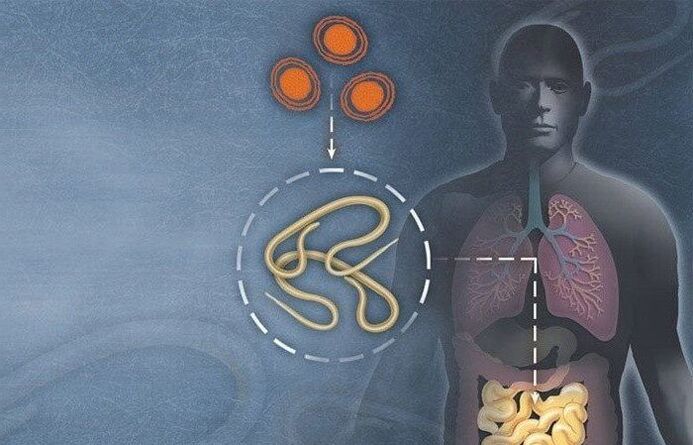
During the consultation, you will be able to speak your questions and the doctor will clarify the situation, decipher the test, answer your questions and give the necessary advice.
I want to get the attention of people who want to get their treatment done. If you come to the pharmacy and ask the pharmacist: "Give me some bug stuff", then you are making a serious mistake - these things cannot be done. First, pharmacists are not responsible for how you take this medication. Second, no responsibility for the consequences. Third, you will hurt yourself very much. Don't do that. In order to find out if you have a parasitic infection, it is very important to contact a specialist and complete a certain research checklist before proceeding with appropriate treatment.
Which tests show the presence of parasites in humans?
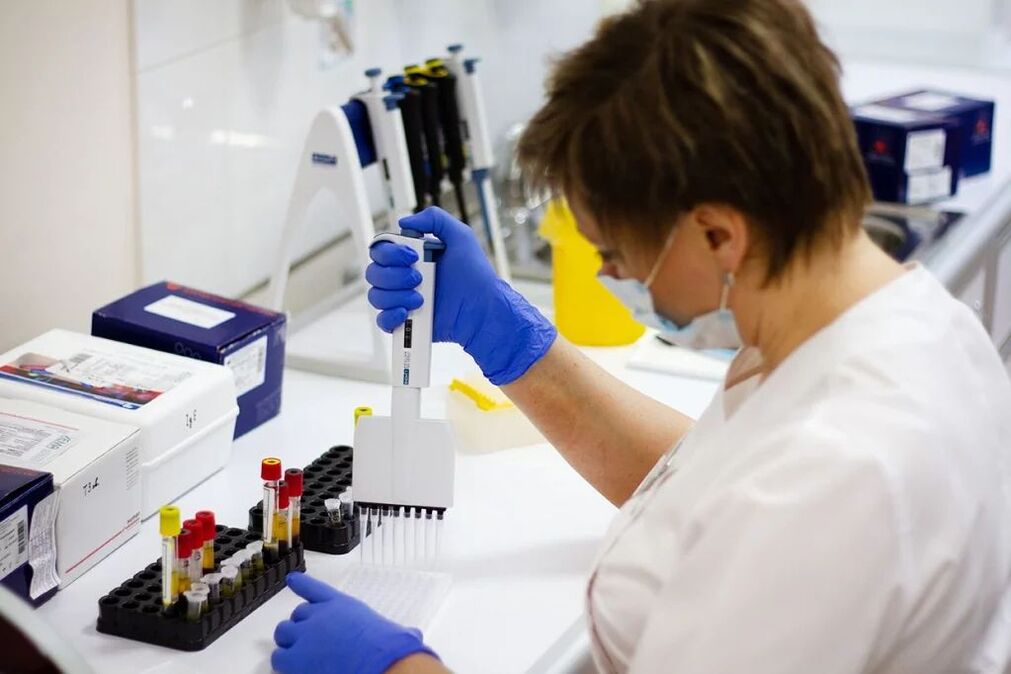
According to the World Health Organization, approximately 4. 5 billion people worldwide are constantly infected with parasites. This situation is complicated by the difficulty of diagnosing parasitic infections. How to find out if there are parasites in the body? What laboratory and instrumental research methods can detect parasitic diseases? Let us consider these issues in detail.
complication
Helminthiasis caused by common types of parasites can be treated with medicines prescribed by your doctor. But without attention to alarming symptoms, deteriorating health, weakness, unexplained fatigue, and weakened immunity, the disease can lead to serious complications.
If the parasite enters the lungs and the patient does not see a doctor, the patient complains of cough, shortness of breath, chest pain, shortness of breath, pneumonia, and even bronchial asthma.
Parasites in the digestive system can cause cirrhosis, liver abscesses, hepatitis, bowel cancer, gastrointestinal bleeding, ascites (ascites), and peritonitis. They also frequently cause the development of chronic kidney disease, meningoencephalitis, and vision loss. Some tapeworms (tapeworms) are more than 1 meter in length, and small roundworms can form dense balls. This disrupts the normal functioning of the body, leading to severe poisoning, pronounced allergic reactions. Death is possible without emergency medical care.
prevention
Helminthiasis usually occurs when hygiene regulations are not followed or when food is not processed properly. To prevent worms from invading, you need:
- Don't wear someone else's underwear and don't share a towel with strangers.
- Wash your hands thoroughly before meals - it's important to do this not only before breakfast, lunch, dinner, but also before snacks.
- Wash your hands after using the toilet.
- Wash your hands thoroughly after working in bed and wear thick rubber gloves for all gardening work.
- Use only clean water for drinking and cooking.
- Thoroughly rinse fruits and vegetables under running water.
- Eat heat-treated meat, fish, and seafood.
- Do not buy products on the spontaneous market from individuals who cannot confirm the safety of the goods.
- Monitor your pet's health and deworm regularly, even if your pet lives in an apartment and doesn't go out. To choose a medication and calculate a dose, contact your veterinarian.
- Keep living and working areas clean. Sometimes people put worm eggs on the soles of their shoes. To reduce the risk of infection, you need to regularly wet-clean and disinfect all surfaces.
Even following these rules will not completely eliminate the risk of infection. To prevent the development of the disease, consult a therapist. Doctors will prescribe medicines to prevent helminthiasis. Be sure to let us know how often you travel, if you have pets in the house, personal circumstances. Drug prophylaxis against helminthiasis is recommended twice a year.

















































